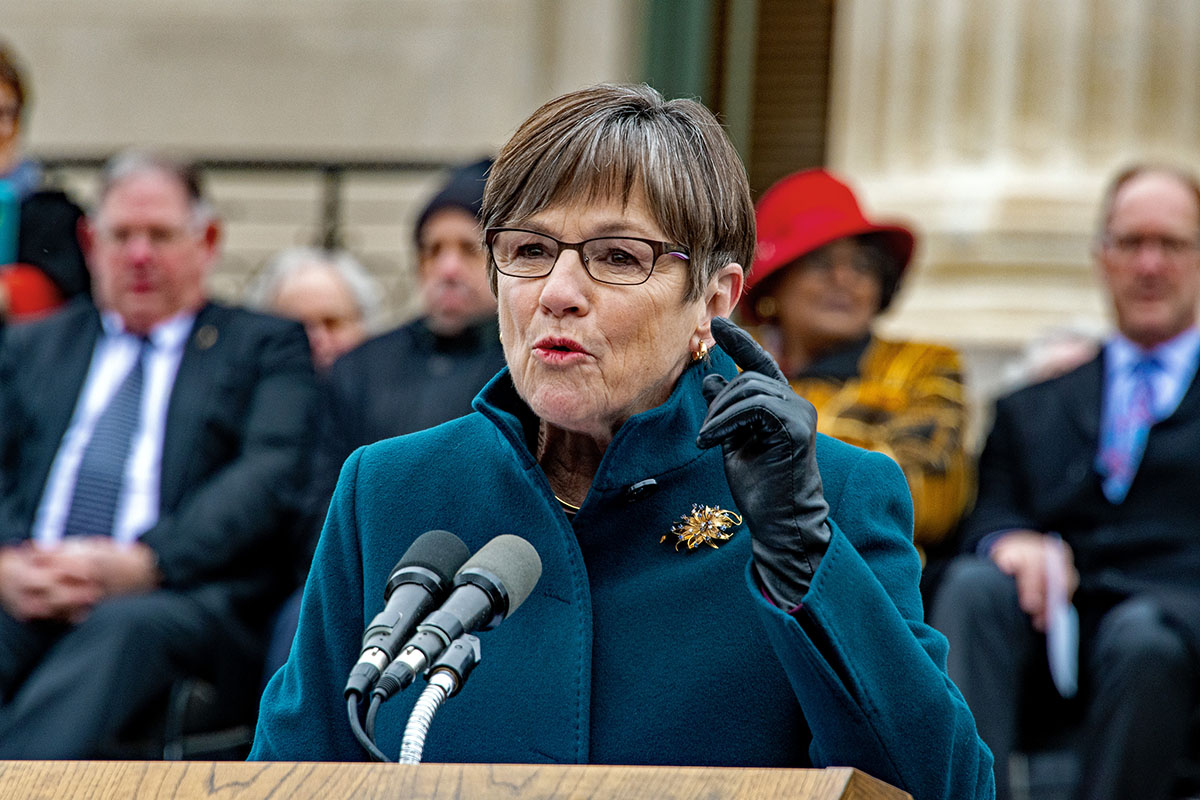Kansas Senate President Susan Wagle appointed a select committee to examine education funding, following a Kansas Supreme Court decision that ruled current funding calculations inadequate. Senate Majority Leader Jim Denning, R-Overland Park, will chair the nine-member committee. Sen. Carolyn McGinn, R-Sedgwick, will serve as vice chair.
They’ll meet for the first time at 1:30 p.m. on Thursday, March 16.
Other members include Senate Minority Leader Anthony Hensley, D-Topeka, Sens. Molly Baumgardner, R-Louisburg; Barbara Bollier, R-Mission Hills; Bud Estes, R-Dodge City; Daniel Goddard, R-Parsons; Dan Kerschen, R-Garden Plain; and Pat Pettey, D-Kansas City.
Where do members of the committee stand on education funding?
Denning
During the 2016 election, Denning campaigned on revamping the K-12 education funding formula. In particular, he said he preferred a funding formula that keeps Johnson County tax dollars in Johnson County schools.
“Currently, our education dollars are exported to Topeka for redistribution elsewhere with only a fraction returning to Johnson County,” his campaign website reads. “This must change!”
Keeping funding in Johnson County schools may prove challenging as previous Court rulings require that funding be equitable across the state. Johnson County taxpayers supply about one-third of the state’s total revenues.
McGinn
McGinn also serves as chair of the Senate Ways and Means Committee. She campaigned as a moderate Republican. Early in the session, she told media she was working on a bill to cut spending to close a then-estimated $340 million budget shortfall for this year. Under her proposal, state aid to schools would have been cut between $90 million and $125 million this year.
She told one news outlet in response to a question about school funding that she believes school policies should be determined at the local level.
“Many in Topeka want to dictate policy from the state level, and I think that’s part of the problem. Our schools can operate best when the decisions are being made at the local level by parents, teachers our our local school boards,” she said.
The ruling could strip some elements of local control, because the ruling holds the Kansas Legislature responsible for students reaching academic outcomes known as the Rose standards.
Hensley
Hensley is the ranking Democrat member of the committee. His campaign website suggests he favors returning to the old funding formula. Prior to block grant funding, lawmakers used base state aid per pupil for most funding. Students were weighted and could count as more than one student under certain circumstances.
“It is imperative to put Kansas schools and teachers first by adequately and equitably funding public education,” his website reads. “This cannot be done without a fully funded school finance formula.”
Estes
On his campaign website, Estes calls himself a “common sense, principled conservative.”
“I know that our children are key to our future,” he writes. “I will work for policies that reduce bureaucracy, reward excellence and ensure that our education dollars make it into the classroom where they belong.”
Bollier
Bollier campaigned as an anti-Brownback Republican in 2016. She voted against block grant funding. Following the Court’s decision a few weeks ago, she told the Shawnee Mission Post that state revenues need to be increased.
“Unfortunately, the Governor vetoed our recent tax package that would begin the path to revenue reform. I stand in disagreement with his decision and recognize that we MUST have adequate money to constitutionally fund our public schools,” she said. “…I am eager to get both a funding formula and a tax package done long before the June 30th deadline; our students are depending on us!
Goddard
Goddard told the Parsons Rotary Club last weekend that he’s not sure the legislature will do something that satisfies the Kansas Supreme Court since Justices didn’t demand a specific dollar amount for adequate funding.
“I don’t think that cutting school funding is going to happen this year given the Supreme Court’s decision,” he said.
He doesn’t want to mess with Kansas Retirement funding, and he opposes securitizing a tobacco fund.
“It costs you more in the long run than it would to take a bite out of the bullet right now,” he said.
Kerschen
Kerschen’s 2016 campaign slogan was “Making government better, not bigger.” He voted for the retroactive tax increases Gov. Sam Brownback vetoed earlier in the session. He said in a newsletter, “..it is a start to fix the budget shortfall the state is experiencing. As we continue the budget process, considerations for cuts may still be on the table as a revenue generator.”
Pettey
Following the release of the Court’s funding decision, the Kansas City, Kansas, Democrat told the Wyandotte Daily the old formula worked well.
“We have done a fair job in the past,” she told the publication. “We have a good formula that addressed the issues, but we weren’t funding it. So now the courts have stepped forward again to say you have a responsibility constitutionally to fund education, K-12 education.”
The old formula may be impossible to reinstate, because the formula does not take educational outcomes into consideration, and the Court ruled a new formula must be “adequately calculated.”
Baumgardner
Baumgardner is arguably the most conservative member of the committee. She told the Sentinel following that the ruling that she would like a see a new formula that shifts funding to specific at-risk students.
“A lot of extra funding has gone to more teachers to reduce classroom size, but not for specialized reading teachers or math intervention teachers, and you still have kids that need that special, individualized attention,” she said.
A Kansas House committee hosted hearings on three school financing plans before the Court issued its ruling. Two of the three plans are based on the old school financing formula. A third attempts to fund by measuring per pupil funding from some of the state’s top performing schools to draw a conclusion on what it costs to adequately fund for the best educational outcomes.
Lawmakers have a Court-imposed deadline of June 30 to craft a new school funding formula.


